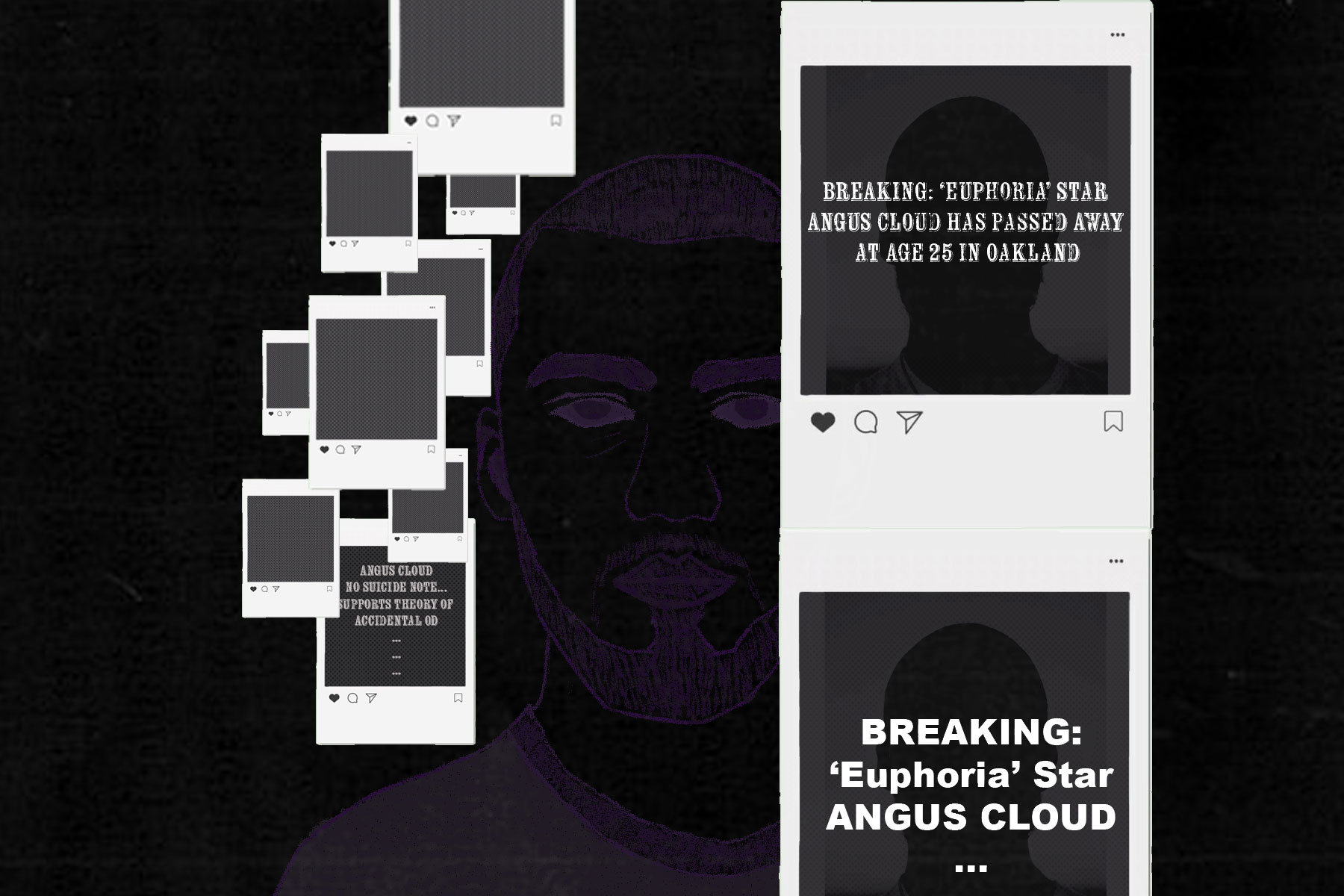Angus Cloud never thought he would be an actor. In his own words, “The difference between me and everyone else who’s famous it’s that they were trying to get famous… I had no idea it would go this far.” On the buzzworthy HBO show “Euphoria,” his character Fez is a laid-back, charismatic drug dealer with good intentions to protect recovering addict Rue (Zendaya). Off-screen, the Oakland native lived with the same mellow magnetism and often downplayed his stardom, saying that he didn’t like the sudden attention from interviewers because he’s “not good at answering them.” There was no denying the genuine sincerity and warmth Cloud brought to each scene or the number of fans he touched with his performance. Unfortunately, the rising star passed away on July 31 at the age of 25.
Cloud’s passing came as an unsettling shock to everyone, prompting rumors that the untimely death was intentional. Speculations of suicide heightened after his family’s statement mentioned that he “intensely struggled” to cope with the recent death of his father and was “open about his battle with mental health.” These words, in the minds of fans, seemed to be code for a premeditated drug overdose and revealed a dark truth about the way audiences view their favorite actors. Simply because Angus Cloud portrayed a drug dealer on a show that highlights addictive substances, fans conflated him with his character and jumped to unfounded conclusions. The online gossip became so overwhelming that Cloud’s mother issued another statement to invalidate the misconceptions: “We may find out that he overdosed accidentally and tragically, but it’s abundantly clear that he did not intend to check out of this world.”
The only thing more appalling than Cloud’s death itself was the deranged response it garnered from fans of “Euphoria.” Once the news broke, droves of vulturous fans flocked to the comments of various old Instagram posts, condemning “Euphoria” stars for their delayed responses to the news and the lack of tributes to their friend. On a July 22 post from Zendaya, one fan wrote “Post about him it seems like u don’t care” — a complete disrespect for her grieving process. The moral policing became so overwhelming that Zendaya’s eventual post about Cloud was concluded with a disclaimer: “please be kind and patient as grief looks different for everyone.”
On Maude Apatow’s July 27 post, fans alluded to the fact that Apatow and Cloud were on-screen love interests and reacted as if the costars were in a relationship off-screen. One user dejectedly remarked “Incomplete love story between fez & lexi,” where the use of the word “story” conveys the perception that there is a fictional element to these actors’ lives. To the “Euphoria” fandom, Angus and Maude didn’t exist as real-life friends, they only existed within the television screen-sized dimensions of the budding romance between their characters. Some viewers become so engrossed in the world of a show that they forget to separate the actors from their characters; we too easily confuse Angus with Fez, or we naively want to believe that they are the same person.
Some of the ugliest reactions to Cloud’s passing were displayed on the official “Euphoria” Instagram account as fans took to the comments to speculate about the show’s uncertain trajectory without one of its main characters. With a general disregard for the young life that was lost, the fandom swiftly adopted a more selfish outlook: “Y’all having us wait forever, now one of my favorite dead…” As evidenced by comments like this one, rabid fans construed the news of Cloud’s death as a personal inconvenience to the production of their beloved show without so much as a second thought about the people who were truly affected.
The way that people attacked Cloud’s costars for not immediately running to social media illuminated a disturbing dynamic between fans and the entertainment they consume. Audiences seem to believe that entertainers exist for the sole transactional purpose of providing us with content. Thus, outrage ensues when celebrities don’t meet those expectations. Zendaya can’t privately mourn the death of her friend because she owes “Euphoria” fans a heartfelt digital shrine to his memory as soon as she hears the news. She is afforded no time to process her grief or navigate difficult feelings because her fans stipulate visible evidence of her bereavement.
Perhaps the binge-watching culture our generation has become enamored with fosters a codependent relationship to the entertainment we consume. Viewers wholeheartedly dive into the environment of a show and don’t know how to resurface without detaching themselves from what they just watched. In a conversation with the New York Times, psychologist Sherry Turkle alluded to this increased sense of proximity to stars when she said that “the gaze is still reverential, but it’s much more proprietary and unchained. It has all the passion, but the filters, the boundaries are gone.” There seems to exist a warped perception of fiction and reality, almost as if the actors themselves cease to exist without a character to be tethered to. Angus Cloud’s death serves as the perfect example: he existed beyond the confines of “Euphoria”’s weekly episodes, but his death generated more questions about the fictional Fez’s legacy than his own.
These perverse social media interactions with celebrities are worse than well-intentioned celebrity worship or fictophilia because the fans are operating from a place of hate. Behind the shrouding shield of a smartphone screen, anyone can muster up the confidence to heckle a celebrity or to demand a certain action from them. Consider it a digital mob mentality, where a single comment inspires a crop of angry fans to sprout up in the comments until the positivity is outnumbered by the spite.
It can be difficult to sympathize with A-list celebrities since any emotional strife they endure at the hands of fans can likely be wiped away with their millions of dollars and the privileges that characterize stardom. If a pesky internet troll is their worst problem, then they have a pretty easy life, right? But fans can only speculate and hypothesize from the outside looking in. No matter how connected we feel to these celebrities, we’ll never have access to their internal thoughts and problems—and we shouldn’t. The upsetting irony of this situation is that it started because of Angus Cloud, who didn’t wish to be a celebrity and didn’t act like one once he acquired fame. The public scrutiny of celebrities is exactly the type of treatment Cloud wanted to avoid, yet his death unleashed a wave of intrusive prying that nobody deserves.
















As someone who’s struggled with mental health while being constantly “seen,” I get it Sprunki Retake —fame doesn’t protect you from pain. Angus deserved peace, not pressure. Let’s be kinder, even when we think we know someone’s story.
I appreciate what you share in the post. Thanks to your post, I have gained a lot of new and useful knowledge. Geometry Dash
Consider it a digital mob mentality, where a single comment inspires a crop of angry fans to sprout up in the comments until the positivity is outnumbered by the spite octordle free.